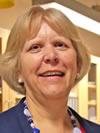 Melinda Darby Dyar |
2016 G.K. Gilbert Award
Presented to Melinda Darby Dyar
Citation by Molly Mccanta
I am honored to present the 2016 GSA Planetary Geology Division’s G.K. Gilbert Award to Darby Dyar. Darby is being honored for her “outstanding contributions to the solution of a fundamental problem(s) of planetary geology in its broadest sense, including planetary geology, geochemistry, mineralogy, petrology, and the field of meteoritics.”
Darby received her Ph.D. in 1985 at MIT from the great Roger Burns. There began her passion for calibrating spectroscopy observations using the most exacting standards possible, and for connecting the interpretations to real physics, optics, composition, and conditions. Her 1985 review paper on using Mössbauer spectroscopy to analyze Fe valency and coordination in minerals and glasses continues to be cited hundreds of times per year. In addition to her Mössbauer research, Darby has published more than 200 peer-reviewed papers analyzing geologic materials using Raman, LIBS, XANES, and FTIR. Her two textbooks covering mineralogy and geostatistics have been widely adopted in college classrooms. Her exacting science and insightful questions have changed our understanding of geologic processes on Mars, Venus, the Moon, meteorite parent bodies, and Earth.
Perhaps most astonishing is that Darby has accomplished all of this while at Mount Holyoke College, a liberal arts college with no graduate program. Such a high research output, without graduate students, on top of a full-time undergraduate teaching load is almost unheard of. Darby has supervised 30 theses and countless research projects. Her teaching and mentorship has helped foster many of the next generation of geoscientists.
Darby has also been a tireless advocate for women in science. She gives freely of her time, expertise, and data. She has created a relentlessly positive, collaborative atmosphere in which all manner of people, from undergraduate to senior scientist, thrive. Darby is a world-class researcher, teacher, and mentor, and a consummate team player. She is truly deserving of the G.K. Gilbert Award.
 2016 G.K. Gilbert Award — Response by Melinda Darby Dyar
2016 G.K. Gilbert Award — Response by Melinda Darby Dyar
I am humbled to receive this award, and to join the ranks of those who precede me in this honor.
It is difficult to put into words how much this award means to me. Mine has been a career filled with twists and turns. Graduating from Wellesley College, I thought a woman could do anything. I was right, but I had no idea then what it meant to be dealt “the woman card.” I was harassed at three successive institutions. I was denied tenure. I found another job and moved across the country. I got married, commuted 600 miles per week for five years, and then quit my job on the verge of tenure when I could not handle the commute after my second child was born. I was a part-time visiting faculty member for 7 years, staying home with my kids. I was hired to teach astronomy at Mount Holyoke, and tenured at the age of 42. Many times, I was tempted to drop out of science, but I was motivated by my desire to give the next generation what I myself so badly lacked: a helping hand. There are far too few successful women scientists who mix raising children, taking care of parents, teaching full-time, mentoring students, and pursuing vigorous research programs. Imperfect though my career has been, I wanted to be a role model to show that if you have passion for your work, you can overcome a lot. You can put your family and students first and your career a distant third, and still make fundamental and lasting contributions to science.
This award also recognizes that it is possible to do world-class research with undergraduate students. Those of us who focus on undergraduate education lay the foundation for our profession: we teach our own labs, grade our own papers, and spend hours supporting our students. Yet there is nothing in that list of priorities that prevents us from being passionate about our work and doing great research. My own most interesting research directions have come from students, including work on mineral-microbe interactions and in the field of machine learning. I am happy to accept this award on behalf of the thousands of us in the teaching ranks who use research not only as an end to itself, but as a vehicle to teach the next generation what it means to be a scientist.
Finally, I am grateful to so many people! Roger Burns convinced me that an art history major could be an MIT geochemist. Charlie Guidotti, Jerry Delaney, and Steve Mackwell were early friends and supporters. George Rossman has been a career-long source of wisdom. My “adopted brother” Mickey Gunter and local compatriots Tekla Harms and Sheila Seaman have helped me survive the past difficult decade. All my students have motivated and sustained me. My children, Duncan and Lindy Crowley, believe in me absolutely. To all of them, and to all those in this community with whom I have collaborated, I give my thanks.
